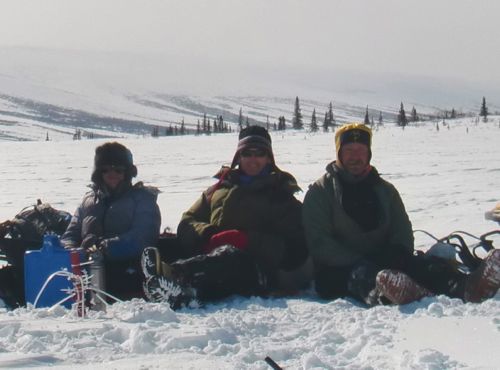 Seated at the end of the day at CiPEHR. Researcher Elizabeth Webb, Researcher/Principal Investigator Ted Schuur and myself.
Seated at the end of the day at CiPEHR. Researcher Elizabeth Webb, Researcher/Principal Investigator Ted Schuur and myself.
I spoke with Ted Schuur (Principal Investigator and Assoc. Prof. at University of Florida) as he prepared to leave Healy, AK. for the two hour drive to Fairbanks. Then flight back to Florida. I was curious about his motivation for designing and conducting with Dr. Sue Natali the Carbon in Permafrost Experimental Heating Research (CiPEHR) experiment. Dr. Schuur finished his post-doctorate work on carbon cycling in Hawaii. He was aware at the time of increasing global temperatures. Dr. Schuur was listening to others talk about how that increase in temperature would affect northern soils/ tundra however there was little hard data on these effects. He felt his role could be, “helping people understand the role of carbon cycling in the world”. By conducting this CiPEHR experiment he hopes to answer questions about warming that are being “answered” without hard data.
 View of CiPEHR Site looking southeast. John Krapek, field technician and Elizabeth Webb, researcher in the foreground.
View of CiPEHR Site looking southeast. John Krapek, field technician and Elizabeth Webb, researcher in the foreground.
The ability to gather good scientific data in the arctic is not easy. It is a very difficult environment to work in. The experiment at CiPEHR, though simple in design, when carried out year around in a climate where permafrost is prevalent becomes complex. This past week snow removal from the CiPEHR project highlighted that difficulty. The weather, cold, mental and physical stamina played important roles in the team’s ability to minimize variables in the on going experiment. Removing the snow in a consistent manner from the warming part of CiPEHR has been an annual event for 5 years. I was impressed with the professionalism, strength, and sense of togetherness the team Dr.’s, Ted Schuur and Sue Natali along with Elizabeth Webb put together at CiPEHR to remove snow and help answer important questions related to the future of our earth.
A lesson I will take with me is; Students are taught that scientific research is the ability to use technology to answer questions. For research to occur and good data to be gathered scientific research requires among other things skills in forward planning, logistics and teamwork. These parameters are rarely taught in conjunction with science and are many times the deciding factors in whether on not the research is conducted at all.

